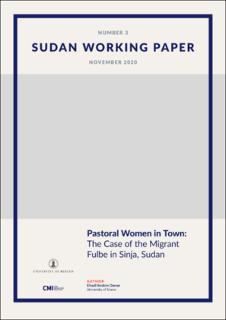Pastoral Women in Town: The Case of the Migrant Fulbe in Sinja, Sudan
Working paper
Permanent lenke
https://hdl.handle.net/11250/2688106Utgivelsesdato
2020-11-01Metadata
Vis full innførselSamlinger
- Publications [1488]
Originalversjon
Bergen: Chr. Michelsen Institute (Sudan Working Paper SWP 2020:3) 48 p.Sammendrag
The world has witnessed rapid urbanization and an increased number of women migrating in a phenomenon known as the femininization of migration. Urban areas are becoming extremely overcrowded and overburdened, putting pressure on insufficient infrastructures, schools, health facilities, sanitation and water systems. More rural young men and women in sub-Saharan Africa (SSA) migrate to cities to escape poverty. Being unprepared for the risks that await them in ill-equipped cities, many of these vulnerable youth turn to violent acts of theft, robbery, and trafficking when basic needs cannot be met. Women are at the heart of this maelstrom of movement, but there is concern that as the number of women migrating increases, incidences of abuse and exploitation also increase. Life in the city has resulted in marginalization and social exclusion, especially because the urban centers are overtaxed and underprepared for the new migration patterns. Many rural migrants are no better off in the city and they have become human rights victims with no parental protection or legal rights. Women in particular face barriers to the labor market and significant vulnerabilities and health risks because of their gender, immigration status, employment context, and living conditions. This paper examines this problem in the context of Sudan, examining pastoral women’s migration to Sinja town.
